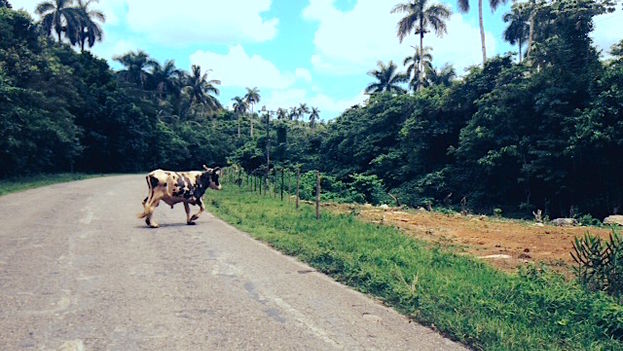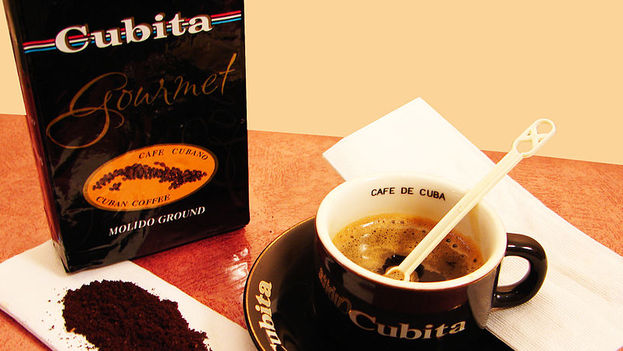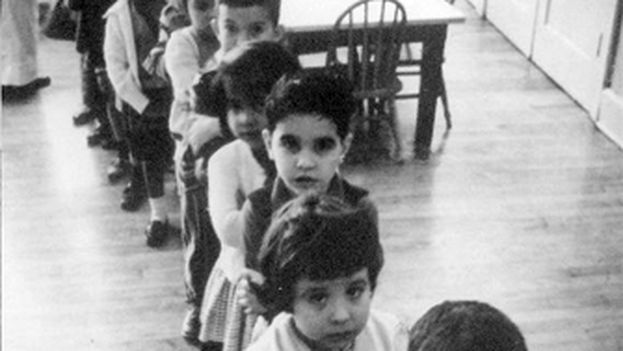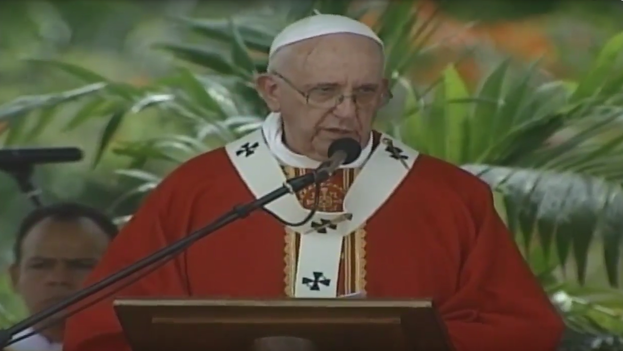
![]() 14ymedio, Jorge Guillen, Candelaria, 29 July 2016 — He still shudders when he remembers that morning, when the broken glass from the windshield exploded everywhere and he had a taste of metal in his mouth. Ulises Ramirez crashed into two cows loose on the national highway as he was returning from the airport to his native Candelaria. The encounter with these animals ended up with serious damag his vehicle and head injuries for himself, but at least his life was spared. Others haven’t enjoyed the same fate.
14ymedio, Jorge Guillen, Candelaria, 29 July 2016 — He still shudders when he remembers that morning, when the broken glass from the windshield exploded everywhere and he had a taste of metal in his mouth. Ulises Ramirez crashed into two cows loose on the national highway as he was returning from the airport to his native Candelaria. The encounter with these animals ended up with serious damag his vehicle and head injuries for himself, but at least his life was spared. Others haven’t enjoyed the same fate.
Between 2010 and 2015 at least 1,054 accidents, resulting in 12 deaths and 279 people injured, were caused by loose cattle on the road, according to data from the official newspaper Granma. continue reading
Ramirez notes that, a few minutes before he would have arrived home, he made out in the darkness a herd walking or sleeping on the asphalt. He braked, swerved to avoid the crash and desperately sounded the horn. When he thought he would get out of unharmed, he felt a strong impact on the right side of the car. The next thing he saw was two cows lying on the road and the blood running from his head.
Although the law strictly prohibits “leading animals to graze or to water and allowing them to remain on the paved road or the surrounding areas and in conditions that allow them to access it,” the problem does not seem to have gotten better.
As a general rule, the official press blames the rancher who doesn’t keep his animals safely off the road, but the farmers say “they don’t sell us barbed wire to put up a fence to keep the cattle from escaping and causing problems on the nearby roads.” “It is very easy to impose fines and confiscate cows,” complains Hermes Amador, who calls himself “the best milk producer in Candelaria.” For this Artemisan, who has 66 acres of land leased in usufruct to support his cows, the law is not applied equally to cattle belonging to state enterprises.
“The State’s cows live on the road and nothing happens,” he complains. “At Kilometer 52, Commander Guillermo Garcia has a farm and the cattle get out every day, and what happens? Nothing happens and there have been several accidents,” he explains. Garcia’s farm belongs to the Flora and Fauna company, a state enterprise that functions as a tourist villa and allows its visitors to go horseback riding, hiking, walking and bird watching. In Cuba more than 50% of the cattle are the property of the state.
The problems faced by these cattle ranchers don’t end with difficulties in buying supplies for their farms. Gregorio Garcia, another producer in the area, has problems selling his livestock. “I’ve a spent a year going after the buyers of a livestock company trying to sell three bulls who aren’t quiet in the paddock,” he explained to this newspaper. But, still, “every month they talk about the topic at the cooperative meeting, nothing happens.” The producer says he feels sorry for “some of the neighbors whose animals have been injured” and he says they had to pay “a 500 peso a day fine for when they were out on the road.”
Cuban farmers cannot slaughter their own cattle and must deliver them “on the hoof” to the state, which deals with the slaughter and distribution of the meat. Thus, Gregorio Cabezas’ restless bulls will continue making mischief until the state slaughterer intervenes.
Santiago Alfian has had to confront the problem in his work as an inspector. He has spent 15 years trying to enforce the decree, which imposes a 500 peso fine and damages against those who graze their animals on the roads or verges of the railways. “In the case of repeat offenders the animals should be confiscated.”
“We have confiscated [cattle] from some farmers who are repeat offenders, but the problems remain,” explains Alfian, who attributes the problem to lack of wire fencing. “When the government sold a little, there was not enough for everyone and it was sold at the very high price of 600 Cuban pesos for a roll of wire,” he adds.
The inspector avoids the question of whether a state company had ever been fined for letting cattle loose on the road. “Well, everyone knows how that goes,” he responds with an eloquent smile.



